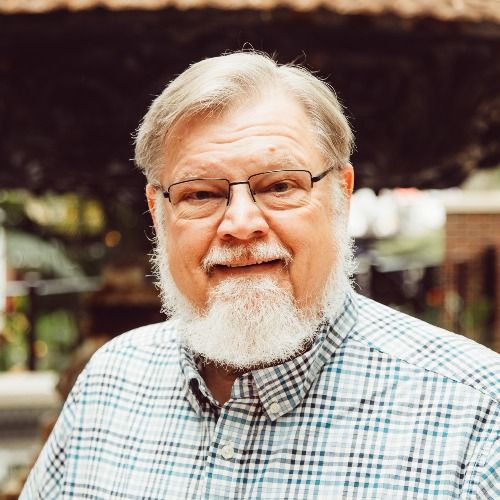Episode 934
Confronting Privilege: Understanding Threats to Social Order
The "Daily Bible Refresh" is presented each day by Rev. Dr. Brad Miller who has a goal of speaking a bit of the bible into two million ears (one million people) in three years (2025-2028).
He is the author of "The A, B, C-1,2,3 Bible Study Guide" Free to you by clicking HERE.
Brad served as a local church pastor for forty years and has a background in radio and podcasting. Moreover, he is a life-long student of The Bible.
He believes in the words of Jesus that “scripture is fulfilled in your hearing” (Luke 4:21)
The "Daily Bible Refresh" is available seven days a week by 6:00 am ET. The episodes are no longer than ten minutes long and are...
- Understandable: A reading from the New Testament (usually the Gospel) selected from the Revised Common Lectionary using "The Message" translation.
- Relatable: You will have a couple of "points to ponder" from the text which will relate to your life
- Applicable: Every episode includes a way you can take action based on the reading
- A recommended resource to help you go deeper in biblical study and spiritual direction.
- A prayer for your day.
A companion resource to the Voice of God Daily Podcast is the “ABC Bible Study Guide” available by clicking HERE.
The "Daily Bible Refresh" is available every day at VoiceofGodDaily.com on Apple Podcasts, Spotify and all major podcast directories.
You can help Dr. Brad attain his goal of getting a bit of the bible into two million ears by subscribing to "Daily Bible Refresh" on Apple Podcasts, leaving a five-star rating, and writing a review. More importantly please share with your network of family and friends about the "Daily Bible Refresh".
Please make listening to the "Daily Bible Refresh" a part of your daily life.
Remember… “All scripture is God-breathed and useful”(2 Timothy 3:16)
The discussion revolves around the profound implications of Acts 19:28-41, where a tumultuous uproar in the city of Ephesus serves as a poignant metaphor for contemporary social justice movements. The frenzy initiated by the local artisans, whose economic interests were threatened by Paul's teachings, highlights the delicate interplay between privilege, fear, and resistance. We delve into the anatomy of outrage, illustrating how a collective reaction can escalate from economic anxiety into fervent religious zeal, often leading individuals to participate in chaos without a clear understanding of the circumstances. This phenomenon is mirrored in today's society, where misinformation and manufactured outrage can easily mobilize the masses, prompting us to ponder how we might identify and counteract such dynamics in our own experiences. Furthermore, we consider the intersectionality of power dynamics that existed in Ephesus, where marginalized identities are frequently scapegoated during social unrest. The rejection of Alexander, a Jew, underscores the complexities of identity and the need for solidarity in the face of oppression. In this context, we are invited to reflect on how various forms of discrimination intersect in our society and how we might advocate for those who are marginalized.
Examining the passage further, we encounter the role of civil authority as embodied by the town clerk, whose rational intervention amidst chaos suggests that systems, while often flawed, can serve as instruments of justice. His admonition to the rioters, urging them to adhere to legal processes rather than succumbing to mob mentality, prompts us to contemplate the balance between engaging with established systems to foster change while maintaining a critical perspective on their inherent flaws. This duality challenges us to navigate our involvement in societal structures, seeking to effectuate meaningful transformation without losing sight of our ethical obligations to critique these very systems. As we reflect on these themes, we are also presented with actionable steps to facilitate deeper understanding and communication across ideological divides, encouraging us to practice sacred listening to those whose views differ from our own. By doing so, we can uncover the underlying fears and concerns that drive resistance to change, ultimately fostering a more compassionate and informed dialogue within our communities.
In conclusion, the episode serves as a clarion call for introspection and action amidst the tumult of societal change. We are reminded that when privilege feels threatened, it is imperative to respond with courage and wisdom, examining our attachments and refraining from reactions rooted in fear. The closing prayer encapsulates this ethos, beseeching divine guidance as we navigate the complexities of our world, striving for peace that transcends mere absence of conflict and embodies true justice. The transformative journey we undertake, although fraught with discomfort, is crucial for liberation and the establishment of a more equitable society. Thus, we are called to become instruments of justice, even when faced with opposition, embodying the principles of love and understanding as we engage in the difficult yet necessary work of fostering change.
Takeaways:
- The podcast explores the dynamics of privilege, particularly when it feels threatened by change.
- We witness a powerful scene of social unrest that mirrors contemporary justice movements.
- Intersectional power dynamics reveal how economic, religious, and political forces interact during crises.
- The town clerk's role emphasizes the importance of civil authority in restoring order and justice.
- We are challenged to engage in sacred listening to understand differing perspectives on social issues.
- The reading from Acts highlights the anatomy of outrage and its relevance to modern society.
Links referenced in this episode:
Companies mentioned in this episode:
- voiceofgoddaily.com
Transcript
When privilege feels threatened.
Speaker A: nd Resistance A study of Acts: Speaker A:We like to read from the Revised Comment Lectionary the New Testament lesson, which is a three year cycle of reading through the entire Bible.
Speaker A:We're in Year C, the Pentecost season.
Speaker A:We make the reading of the Bible understandable by making by using the message version relatable by giving you some points to ponder and applicable applicable by giving you some action steps to take.
Speaker A:It's all brought to you by voiceofgoddaily.com that's the home of the ABC 1, 2, 3 Bible Study Method.
Speaker A: ion years a million people by: Speaker A: reading for the day from Acts: Speaker A:They ran into the street yelling, great Artemis of the Ephesians.
Speaker A:Great Artemis of the Ephesians.
Speaker A:They put the whole city in an uproar, stampeding into the stadium and grabbing the two of Paul's associates on the way, the Macedonians, Gaius and Aristarchus.
Speaker A:Paul wanted to go in too, but the disciples wouldn't let him.
Speaker A:Prominent religious leaders in the city who had become friendly to Paul concurred, by no means go near that mob.
Speaker A:Some were yelling one thing, some another.
Speaker A:Most of them had no idea what was going on or why they were there.
Speaker A:As the Jews pushed Alexander to the front to try to gain control, different factions clamored to get him on their side, but he brushed them off and quieted the mob with an impressive sweep of his arms.
Speaker A:But the moment he opened his mouth, they knew he was a Jew and they shouted him down.
Speaker A:Great Artemis of the Ephesians.
Speaker A:Great Artemis of the Ephesians.
Speaker A:And on and on and on.
Speaker A:They shouted for over two hours.
Speaker A:Finally, the town clerk got the mob quieted down and said, fellow citizens, is there anyone anywhere who doesn't know that our fellow that our district Ephesus, is protector of glorious Artemis and her sacred stone image that fell straight out of heaven?
Speaker A:Since this is here to conduct, since this is beyond contradiction, you'd better get a hold of yourselves.
Speaker A:This is conduct unworthy of Artemis.
Speaker A:These men you've dragged in here have done nothing to harm either our temple or our goddess.
Speaker A:So if Demetrius and his guild of Artisans have a complaint, they can take it to court and make all the accusations they want.
Speaker A:If anything else is bothering you, bring it to the regularly scheduled town meeting and let it be.
Speaker A:Let it be settled there.
Speaker A:There's no excuse for what's happening today.
Speaker A:We're putting our city in serious danger.
Speaker A:Rome, remember, does not look kindly on rioters.
Speaker A:With that, he sent them home.
Speaker A:Well, my friends, we're exploring this really powerful passage from Acts Today, which is all about transformative change and what it teaches us about peaceful resistance.
Speaker A:We witness here in the city of Ephesus a riot sparked by those whose economic and religious privileges were being threatened.
Speaker A:And there's a scene here that mirrors in many ways our contemporary social justice movements and the pushback that they face.
Speaker A:Let's get into the points to ponder.
Speaker A:The first is the anatomy of outrage.
Speaker A:Notice how the crowd's reaction escalates from economic anxiety to religious fervor.
Speaker A:Most participants had no idea what was going on or why they were there.
Speaker A:This mirrors our modern experience with manufactured outrage and viral misinformation.
Speaker A:When privileged groups feel threatened, they often mobilize others through fear over facts.
Speaker A:How might we recognize and respond to such dynamics in our own time?
Speaker A:A second point to ponder is about intersectional power dynamics.
Speaker A:The text here reveals complex intersections of economic, religious and political power.
Speaker A:Alexander's rejection simply of being Jewish shows how marginalized identities are often scapegoated during times of social unrest.
Speaker A:This challenges us to examine how various forms of oppression intersect with our own society and how we might stand with those who face oppression.
Speaker A:Multiple layers of discrimination.
Speaker A:One more point to ponder.
Speaker A:That's the role of civil authority.
Speaker A:Surprisingly, it's the town clerk who brings reason to all this chaos, reminding everyone of the legal processes and peaceful solutions.
Speaker A:This suggests that systems, while often problematic, can sometimes be vehicles for justice.
Speaker A:How do we balance working within systems for change while maintaining our prophetic critique of those same systems?
Speaker A:Here's your action step.
Speaker A:Practice sacred listening to those different from you.
Speaker A:Find someone whose views on a social issue differ from yours.
Speaker A:Instead of arguing, ask about their fears and concerns.
Speaker A:Practice deep listening without judgment.
Speaker A:Seek to understand the root causes of resistance to change and journal about that and learn about both yourself and them.
Speaker A:We'll come back with a closing prayer in just a minute, but I want you to know we have a great resource for you.
Speaker A:It's called the ABC 1, 2, 3 Bible Study Method.
Speaker A:Please go over to our website, voiceofgoddaily.com it's free to you, so pick it up there.
Speaker A:Let's pray, oh God, you're the source of peace and justice.
Speaker A:And when chaos swirls all around us, help us find our center in you.
Speaker A:When privilege feels threatened, give us courage to examine our attachments.
Speaker A:When others react in fear, grant us wisdom to respond with love.
Speaker A:When systems seem overwhelming, show us the path of peaceful resistance.
Speaker A:Remind us that transformation, though uncomfortable, leads to liberation.
Speaker A:And make us instruments of your justice even in the face of opposition.
Speaker A:Amen.
Speaker A:It's great to be with you here on the Daily Bible Refresh.
Speaker A:I want to just share with you that this podcast is completely listener supported.
Speaker A:If you'd like to support us, we would just really be thankful and grateful for that.
Speaker A:Head over to our website, voiceofgoddaily.com scroll to the bottom.
Speaker A:There's a place where you can make your your gift of a dollar or more.
Speaker A:My name is Dr. Brad Miller and we're here to be with you here on the Daily Bible Refresh.
Speaker A:Remember, true peace isn't the absence of conflict, but the presence of justice.



